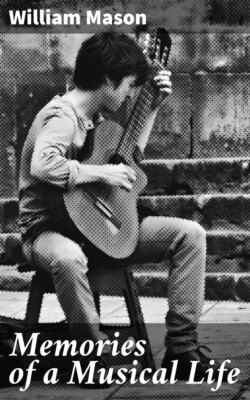Читать книгу Memories of a Musical Life - William Mason - Страница 16
На сайте Литреса книга снята с продажи.
MEETING WITH MEYERBEER
ОглавлениеTable of Contents
I ARRIVED in Paris shortly after six o'clock in the morning, and went to the Hôtel de Paris, in the Rue de Richelieu. In those days, at that early hour, Paris was as quiet as an American town at midnight. There were three of us in the party. We secured two rooms, and my friends remained up-stairs, while I returned to the porter's lodge below to have my passport sent to the Bureau of Police to be viséd. The porter went out to attend to this, and I was left alone in the lodge.
Shortly afterward a man entered, of medium height, well dressed, and with a good deal of manner. He addressed me in French, but when I asked him if he could speak English he began conversing fluently in that language. He asked if I was from England and a stranger in Paris. When I told him I was from America, he exclaimed, "Ah, that is farther off." Then, noticing the passport, which was uncommonly large and was bound like a book, he asked, "Is that an American passport? Please let me have a look at it I'm curious to see it." Bound in with the passport were a number of blank leaves to be used for the visés of various consuls. "Young man," said my chance acquaintance, "you have leaves enough there to travel about Europe for twenty years." Then he inquired if I was traveling for pleasure or on business.
"I have come over to study music."
"Ah, composition?"
"No; mainly piano, but also theory and composition."
"And where?"
"I expect to go to Leipsic to study with Moscheles, Hauptmann, and Richter. Eventually I hope to go to Liszt."
"Well, well, you've chosen good men. Moscheles knew Beethoven."
Then, with a few friendly words, he left the lodge and entered the hotel. Just as he was leaving the porter returned.
"Who is the gentleman?" I asked, pointing after the disappearing form.
"Meyerbeer, the composer."
The porter then took me into the courtyard and pointed out the room which Meyerbeer occupied, calling my attention to the fact that his window and mine almost faced each other.
"If you look out of your window about eleven o'clock," said the porter, "you will see Mme. Garcia and Roger, the tenor, coming here to rehearse their rôles in the new opera with the composer."
Meyerbeer was so affable at our chance meeting that I think I could easily have followed it up and have seen more of him; but when a boy is in Paris for the first time, he has many things to think of. Moreover, I did not realize that at the end of the century, "Le Prophète," the work which Meyerbeer was then rehearsing, would still be in the repertory of every first-class opera-house. I knew that he was a distinguished composer, but I did not for a moment imagine that his work would live so long. As I now look back through the perspective of time, I realize the opportunity I missed; but I thank the freak of fortune which threw in his way, if only for a few moments, a young man who was too careless to improve the chance acquaintance.
From Paris I returned to Schuberth's in Hamburg. He was an active, enterprising, pushing business man, with a large acquaintance in the musical world, and the knowledge of how to put it to the best use. I remained in Hamburg for some time. Boy-like, I had spent all my money in Paris, and was now obliged to wait for a remittance from home. In Hamburg I met Carl Mayer of Dresden, a fine pianist of the Hummel school, and Mortier de Fontaine, who was very well known in his day as a Beethoven-player—had, in fact, won considerable fame as the first pianist to perform Beethoven's "Sonata, Op. 106" in public. That was his label.
